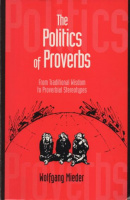categories
- Traffic and Vehicles Catalogue
- socreal.catalog
- Advertisement Catalogue
- Photo Catalogue
- Chinese and Japanese Catalogue
- New Holy Card Catalogue II.
- 12 interesting old books
 Books
Books
 Bibliophil
Bibliophil
 Antiques
Antiques
 Engraving
Engraving
 Maps
Maps
 Photos
Photos
 Antique Papers, Small Prints
Antique Papers, Small Prints
 Posters
Posters
- Circus
- Modern Graphics
- Socialist Realism
- NER Propaganda
- Others
cart
Cart is empty
You've not logged in
Mieder, Wolfgang : Politics of Proverbs - From Traditional Wisdom to Proverbial Stereotypes
- description
- additional information
Proverbs, though anonymous, speak with great authority, and politicians from classical to modern times have deployed them effectively in their rhetoric. In looking at political proverbs in the twentieth century, Wolfgang Mieder—the leading expert on proverbs today—offers proof of the power of these bits of borrowed wisdom to serve any master or any purpose, for good or ill.
Mieder first singles out Adolf Hitler’s Mein Kampf, in which the Führer used proverbs to advocate the deadly goals of Nazism. Pitted against Hitler’s rhetoric is that of Winston Churchill, who was, Mieder demonstrates, as gifted with the proverb as any leader in this century. He moves next to America and Harry S. Truman, whose proverbial plain English won him the trust of the people.
The politics of the Cold War made ample use of proverbs as well, a trend Mieder illustrates through cartoons and caricatures of the time. He also traces the origin, history, meaning, and use of two proverbial slurs, one against Native Americans (“The only good Indian is a dead Indian”) and the other against Asian Americans (“No tickee, no washee.”) The Politics of Proverbs offers a historical view, but also shows that new proverbs are continually coined and passed into common parlance, and old proverbs are updated to suit modern situations. Mieder’s lively and instructive examples show how anyone, whether on the political grandstand or the back porch, can exploit the supposed wisdom of proverbs to justify his or her opinions and actions. By exposing the use and function of the proverb in political rhetoric, this book alerts readers to the possibilities and dangers—and the expressive power—of these not so quaint sayings.
The politics of the Cold War made ample use of proverbs as well, a trend Mieder illustrates through cartoons and caricatures of the time. He also traces the origin, history, meaning, and use of two proverbial slurs, one against Native Americans (“The only good Indian is a dead Indian”) and the other against Asian Americans (“No tickee, no washee.”) The Politics of Proverbs offers a historical view, but also shows that new proverbs are continually coined and passed into common parlance, and old proverbs are updated to suit modern situations. Mieder’s lively and instructive examples show how anyone, whether on the political grandstand or the back porch, can exploit the supposed wisdom of proverbs to justify his or her opinions and actions. By exposing the use and function of the proverb in political rhetoric, this book alerts readers to the possibilities and dangers—and the expressive power—of these not so quaint sayings.
| condition: |     |
| category: | Books > Foreign Language Books > Books in English > |
| category: | Books > Linguistics > |
| category: | Books > Rhetoric > |
| publisher: | University of Wisconsin, 1997. Madison, |
| item number / ISBN: | 9780299154547 |
| binding: | paperback |
| pages: | IX, 260 p. |
| language: | English |












 Telefon:
Telefon: E-mail:
E-mail:







